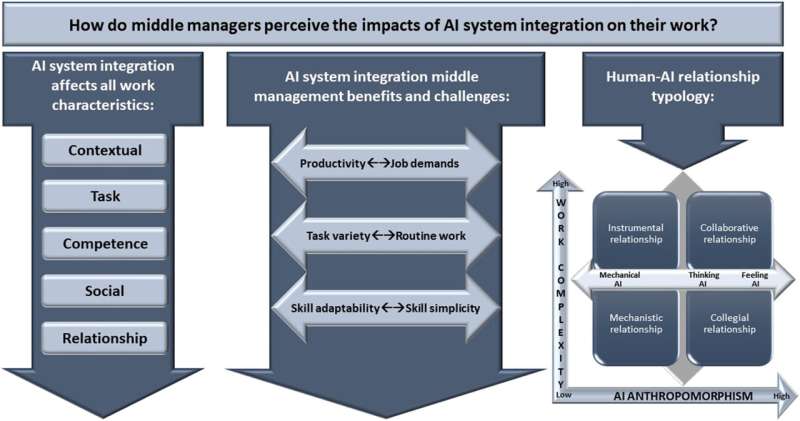This article has been reviewed according to Science X's editorial process and policies. Editors have highlighted the following attributes while ensuring the content's credibility:
fact-checked
peer-reviewed publication
trusted source
proofread
How AI alters middle managers' work

The introduction of artificial intelligence is a significant part of the digital transformation bringing challenges and changes to the job descriptions among management. A study conducted at the University of Eastern Finland shows that integrating artificial intelligence systems into service teams increases demands imposed on middle management in the financial services field.
In that sector, the advent of artificial intelligence has been fast and AI applications can implement a large proportion of routine work that was previously done by people. Many professionals in the service sector work in teams that include both humans and artificial intelligence systems, which sets new expectations on interactions, human relations, and leadership.
The study analyzed how middle management has experienced the effects of integration of artificial intelligence systems on their job descriptions in financial services. The article was written by Jonna Koponen, Saara Julkunen, Anne Laajalahti, Marianna Turunen, and Brian Spitzberg and was published in the Journal of Service Research.
Integrating AI into service teams is a complex phenomenon
Interviewed in the study were 25 experienced managers employed by a leading Scandinavian financial services company. Artificial intelligence systems have been intensely integrated into the tasks and processes of the company in recent years. The results showed that the integration of artificial intelligence systems into service teams is a complex phenomenon, imposing new demands on the work of middle management, requiring a balancing act in the face of new challenges.
"The productivity of work grows when routine tasks can be passed on to artificial intelligence. On the other hand, a fast pace of change makes work more demanding, and the integration of artificial intelligence makes it necessary to learn new things constantly. Variation in work assignments increases and managers can focus their time better on developing the work and on innovations. Surprisingly, new kinds of routine work also increase, because the operations of artificial intelligence need to be monitored and checked," says Assistant Professor Koponen.
Is AI a tool or a colleague?
According to the results of the research, the social features of middle management also changed, because the artificial intelligence systems used at work were seen either as technical tools or colleagues, depending on the type of AI that was used. Especially when more developed types of artificial intelligence—such as chatbots—were included in the AI systems, they were seen as colleagues.
"Artificial intelligence was sometimes given a name, and some teams even discussed who might be the mother or father of artificial intelligence. This led to different types of relationships between people and artificial intelligence, which should be considered when introducing or applying artificial intelligence systems in the future. In addition, the employees were concerned about their continued employment, and did not always take an exclusively positive view of the introduction of new artificial intelligence solutions," Professor Julkunen explains.
Integrating artificial intelligence also posed ethical challenges, and managers devoted more of their time to ethical considerations. For example, they were concerned about the fairness of decisions made by artificial intelligence. Aspects observed in the study showed that managing service teams with integrated artificial intelligence requires new skills and knowledge of middle management, such as technological understanding and skills, interactive skills and emotional intelligence, problem-solving skills, and the ability to manage and adapt to continuous change.
"Artificial intelligence systems cannot yet take over all human management in areas such as the motivation and inspiration of team members. This is why skills in interaction and empathy should be emphasized when selecting new employees for managerial positions which emphasize the management of teams integrated with artificial intelligence," Koponen observes.
More information: Jonna Koponen et al, Work Characteristics Needed by Middle Managers When Leading AI-Integrated Service Teams, Journal of Service Research (2023). DOI: 10.1177/10946705231220462
Journal information: Journal of Service Research
Provided by University of Eastern Finland



















